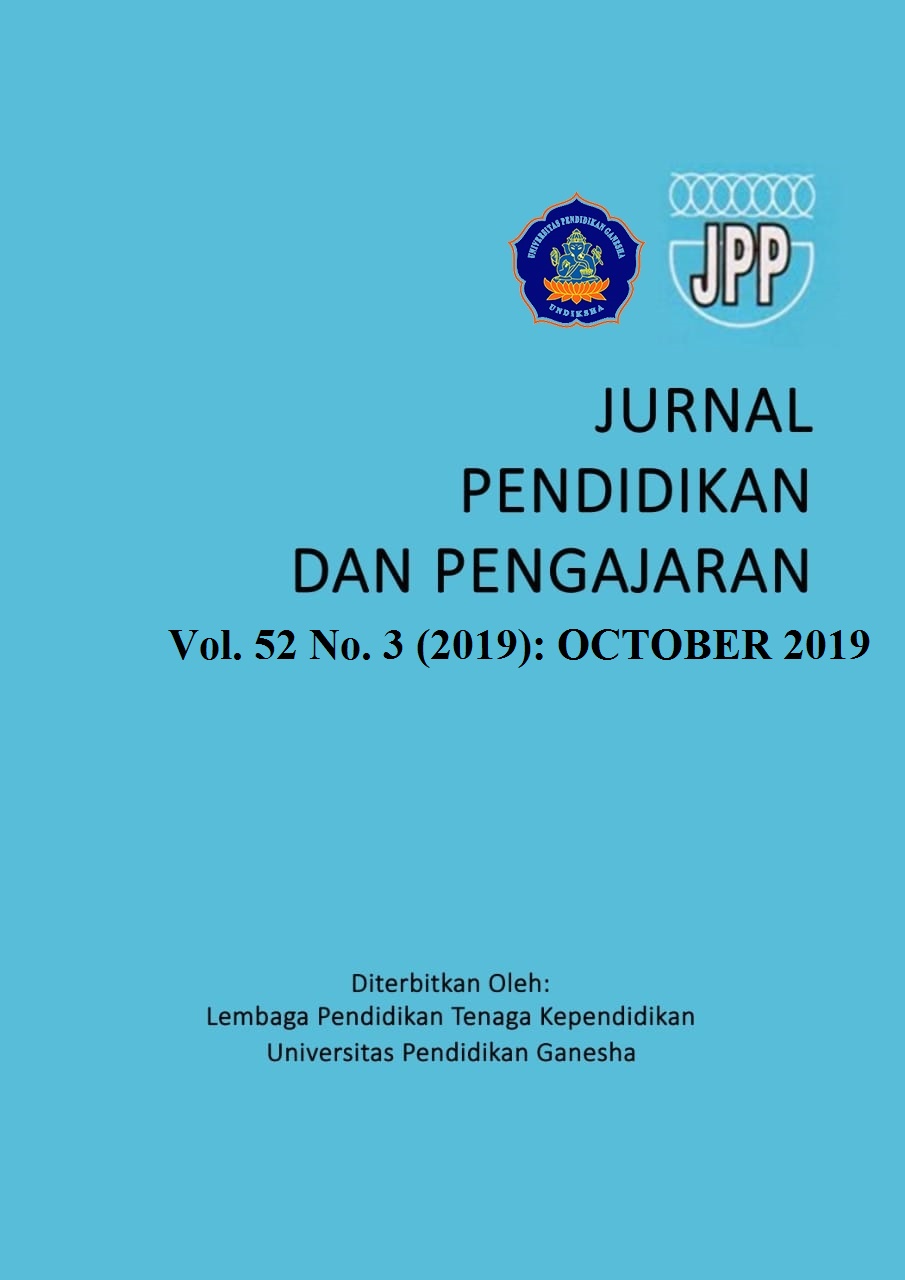The effect of predict-observe-explain (POE) learning model using open-ended problem (OEP) towards students’ mathematical problem solving skill
DOI:
https://doi.org/10.23887/jpp.v52i3.15713Keywords:
POE learning model, open-ended problem, conventional learning, mathematical problem solving skillAbstract
The research aims to determine disverification of the students’ mathematical problem solving skill differences with Predict-Observe-Explain (POE) learning model using open-ended problem (OEP), students who are using POE learning model and students who following conventional learning. This research is quasi-experiment with post-test only control group design. The population that is observed in this research is students of Senior High School number 5 Denpasar 2018/2019 school year in eleventh grade. Sample which has been picked is 3 classes using cluster random sampling thecnic. There are from 3 classess have been chosen 2 classes are being experimental classes and 1 class is a control class. Students’ mathematical probem solving skill measures using mathematic problem solving skill test. Data which is gained analyzed using one way ANAVA to find out first hypothesis and continued with scheffe test. Hypothesis test result showed that: firstly, there are differences of mathematical problem solving skills between students who used POE learning model using open-ended problem and students who followed conventional learning method (F_count=19,24 and F_table=3,08 ; F_count>F_table); secondly, students’ mathematical problem solving skill by the students who use POE learning model is better than students who following conventional learning (F_scheffe=10,43 and F'=6,16 ; F_scheffe>F'); third, students’ mathematic problem solving skill with POE learning model using open-ended problem is better than the students who followed conventional method konvensional (F_scheffe=9,09 and F'=6,16 ; F_scheffe>F'); fourth, students’ mathematic problem solving skill using POE learning model using open-ended problem is better than the students who only got conventional learning (F_scheffe=38,46 and F'=6,16 ; F_scheffe>F'). It can be concluded that POE learning model using open-ended problem give influence towards students’ mathematical problem solving skill.References
Aryani, Made Dwi. 2014. Pengaruh Model Predict-Observe-Explain (POE) Dalam Pembelajaran Matematika Terhadap Kemampuan Berpikir Kritis Siswa Kelas VII SMP Negeri 2 Abiansemal. Universitas Pendidikan Ganesha.
Cardellini, Liberato. 2014. “Problem Solving: How Can We Help Students Overcome Cognitive Difficulties.” Journal of Technology and Science Education 4 (4). https://doi.org/ 10.3926/jotse.121.
Jacobs, G. M, dan Toh-Heng, H. L. 2013. “Small Steps Towards Student-Centred Learning.” Dalam Proceedings of the International Conference on Managing the Asian Century, disunting oleh Purnendu Mandal, 55–64. Singapore: Springer Singapore. https://doi.org/10.1007/978-981-4560-61-0_7.
Joyce, C. 2006. Predict, Observe, Explain (POE). http://arb.nzcer.org.nz/strategies/poe.php.
Kostousov, S. dan Kudryavtsev, D. 2017. “Towards a Framework of Using Knowledge Tools for Teaching by Solving Problems in Technology-Enhanced Learning Environment.” International Association for Development of the Information Society.
Kumarayasa, I Wayan. 2016. Pengaruh Model Pembelajaran Generatif Berorientasi Masalah Matematika Terbuka Terhadap Kemampuan Pemecahan Masalah Matematika Siswa Kelas XI MIPA SMA Negeri 3 Singaraja. Singaraja: Universitas Pendidikan Ganesha.
Liew, C. W. 1998. The Effectiveness of Predict-Observe-Explain Technique In Diagnosing Student’s Understanding of Science and Identifying Their Level of Achievement. Curtin University of Technologi: Science and Mathematics Education Centre.
NCTM. 2000. Principles and Standards for School Mathematics. www.nctm.org.
Sari, Dian Maya. 2014. Pengaruh Penerapan Model Pembelajaran Kooperatif Tipe CO-OPCO-OP Terhadap Kemampuan Berpikir Kritis Matematika Siswa SMP Negeri 18 Pekanbaru. http://repository.uin-suska.ac.id/4743/2/BAB%201.pdf.
Son, J. W., dan Lee, M. Y. 2016. “Preservice Teachers’ Conception Of Effective Problem-Solving Instruction And Their Problem Solving.” J. A., 8.
Sudiarta, I. G. P. 2008. Paradigma Baru Pembelajaran Matematika Membangun Kompetensi Berfikir Kritis Melalui Pendekatan Open-Ended. Edisi Revisi. Singaraja: Undiksha.
Sudiarta, I. G. P. 2010. Pengembangan Model Pembelajaran Inovatif. Karangasem: Makalah Pelatihan MGMP.
Sugiyono. 2015. Metode Penelitian Pendidikan (Pendekatan Kuantitatif, Kualitatif, dan R&D). Bandung: Alfabeta.
Suryawan, I. P. P. 2014. “Pengembangan Perangkat Pembelajaran Matematika Untuk Model Pembelajaran Penalaran Dan Pemecahan Masalah (Mp3m) Berorientasi Masalah Terbuka,” 20.
Tösten, Rasim. dkk. 2017. “The Impact of Parental Attitudes on Problem Solving Skills in High School Students.” Universal Journal of Educational Research 5 (1): 170–74. https://doi.org/10.13189/ujer.2017.050121.
Downloads
Published
How to Cite
Issue
Section
License
Authors who publish with Jurnal Pendidikan dan Pengajaran agree to the following terms:- Authors retain copyright and grant the journal the right of first publication with the work simultaneously licensed under a Creative Commons Attribution License (CC BY-SA 4.0) that allows others to share the work with an acknowledgment of the work's authorship and initial publication in this journal
- Authors are able to enter into separate, additional contractual arrangements for the non-exclusive distribution of the journal's published version of the work (e.g., post it to an institutional repository or publish it in a book), with an acknowledgment of its initial publication in this journal.
- Authors are permitted and encouraged to post their work online (e.g., in institutional repositories or on their website) prior to and during the submission process, as it can lead to productive exchanges, as well as earlier and greater citation of published work. (See The Effect of Open Access)





